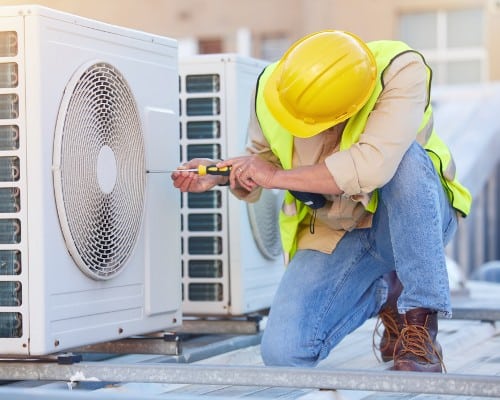Have you ever retreated to your air-conditioned sanctuary to escape the summer heat, only to find yourself coughing, sneezing, or experiencing a rash?
You might find yourself asking, “Can someone be allergic to air conditioning?” While it may seem bizarre, some people actually have allergic reactions caused by their AC units. Yes, you read that right! Just when you thought that the refreshing gust of cold air from your trusty AC unit could do no wrong, here we are delivering the cold truth.
But fear not; we’re here to help you identify if this cool conundrum is affecting you. We’ll be your friendly guide to understanding if your air conditioner is causing allergies by pointing out some telltale signs and symptoms.
So, before you dial your best buddy at River Valley Air Conditioning, Inc., grab a cup of coffee, sit back, and let’s explore this chilly mystery together.
Allergic to air conditioning symptoms – 10 signs of trouble
If you’re suspicious that your AC unit is causing allergic reactions, then your symptoms will become your greatest clue. The list below details several signs that could indicate an allergic response to allergens commonly present in air conditioning systems.
If these symptoms arise frequently when in air-conditioned environments, and you think you’re allergic to air conditioning, ask your doctor to investigate the possibility of an AC or AC-related allergy.
- Sneezing: If you notice yourself continuously sneezing when the air conditioning is switched on – it could be a reaction to the allergens being circulated by the system.
- Coughing: Persistent coughing when in air-conditioned rooms is another possible sign. This happens when allergens irritate your respiratory tract.
- Runny or stuffy nose: These are common reactions to allergens. If your nose starts running or becoming congested in response to air conditioning, this may be indicative of an allergy.
- Itchy, red or watery eyes: Airborne allergens can irritate eyes. This causes them to become redder, itchier or produce more tears than usual.
- Rash or hives: Skin reactions are a common response to allergies. If you find that air-conditioned rooms cause you to develop rashes or hives, this could be caused by airborne pollutants being circulated through them.
- Difficulty breathing: This could be an indicator of a severe allergic reaction. Pollen in the air could wreak havoc in your lungs, making breathing harder than usual.
- Fatigue: Continuous exposure to allergens may also contribute to fatigue. If you notice that spending time in air-conditioned spaces causes unusual fatigue, this could be a telltale sign of allergies.
- Sinus pressure: If you experience pressure or pain in the forehead, cheeks, or behind your eyes, it could be due to allergens triggering inflammation in your nasal passages and leading to swelling.
- Postnasal drip: This is when excess mucus from your nose goes down your throat. It’s a common response to irritants in the air.
- Headaches: Frequent headaches when in air-conditioned rooms could be an indication of an allergy. This can occur due to sinus pressure or the body’s response to allergens.
Remember, these symptoms may resemble symptoms associated with common colds. If these signs become persistently apparent when in an air-conditioned environment, consider getting an allergy test done to confirm.
Think you’re allergic to air conditioning? Common causes of reactions
Most people aren’t actually allergic to the air conditioning system itself but rather to allergens that can get circulated through the air conditioning system. Here are some potential culprits:
Dust and dust mites
These microscopic creatures may be invisible to the naked eye, but they thrive in warm and humid environments like your home. When dust accumulates on surfaces or you use air conditioning systems regularly, these bugs can find their way inside and get circulated around each room.
Mold and mildew
Air conditioning units can become a prime breeding ground for mold and mildew if not routinely maintained. These spores can get dispersed into the air when the unit is in use, causing allergic reactions.
Pollen
This is a common allergen that can easily enter your home through windows and doors. Air conditioning systems can circulate pollen around your home, increasing your exposure.
Pet dander
If you have furry friends at home, their skin flakes – known as dander – can become airborne and enter your air conditioning system. Like the allergens above, they get circulated around your house when the unit is switched on.
Chemical irritants
In some cases, people may be sensitive to certain chemicals used within air conditioning systems. For instance – cleaning chemicals or even a specific coolant could cause allergies in some individuals. If this is the case, ask a professional repair technician for guidance.
Bacteria
Air conditioning units can sometimes harbor bacteria – especially if they are not regularly serviced and cleaned. When the air conditioner is in use, these bacteria can be dispersed through the air, potentially causing allergic reactions.
Tobacco smoke
If someone in the home frequently smokes, tobacco and smoke particles can become lodged in the AC system and recirculate through the home. This can trigger allergies – particularly in non-smokers.
Industrial chemicals
Living near an industrial zone can be a cause of AC allergies. Chemical residues dispersed from the industrial sector could enter your home, into your AC unit and circulate throughout – causing a reaction.
Though it might sound surprising, the question, “Can you be allergic to air conditioning?“ is a question we get often. While your AC unit itself isn’t causing the reaction – regular maintenance of your AC system is key to mitigating allergens in the home.
If you experience allergic reactions whenever your unit kicks on, don’t hesitate to reach out – River Valley Air Conditioning, Inc. is always ready and willing to assist with all your air conditioning needs so your home remains an allergy-free sanctuary!
Feeling the effects of allergies year-round? Contact the pros!
In conclusion, being “allergic to air conditioning” is actually a reaction to the allergens that can potentially circulate through your AC system. Cleaning and maintaining your AC unit can minimize the presence of these allergens and offer you a healthier, more comfortable living or working space.
If your AC has been giving you symptoms of allergies, don’t ignore it – contact us at River Valley Air Conditioning, Inc. today. We’re here to ensure your air conditioning systems are maintained regularly and free of allergens so your home remains as safe a place as it can be. Breathe easy with River Valley Air Conditioning Inc!

